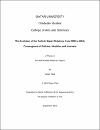The Evolution of the Turkish-Qatari Relations from 2002 to 2013: Convergence of Policies, Identities and Interests
| Advisor | Al-Mezaini, Khaled |
| Author | Pala, Ozgur |
| Available date | 2015-05-07T10:45:45Z |
| Publication Date | 2014 |
| Identifier | Library Catalog: http://mylibrary.qu.edu.qa/record=b1516540~S1 |
| Abstract | This study investigates the dynamics that shaped the Turkish-Qatari relations from 2002 to 2013. First, through a rigorous survey of the literature, it probes the Turkish-Gulf Arab relations from the late 1970s until 2000s with a view to pinpointing prominent dynamics. In light of these general dynamics, the study then zeroes in on the regional and domestic motivations that facilitated a political alignment between Ankara and Doha. Second, through expert interviews, the current study substantiates the findings from the meager literature on the Turkish-Qatari relations. Findings of this study indicate that the historical evolution of the Turkish-Gulf Arab relations is marked by political orientations of actors, security concerns and economic interests. Findings ont he regional dynamics of the more specific Turkish-Qatari relations indicates that close relations between Ankara and Doha cannot be viewed separately from the overall trajectory of relations with the other Gulf Arab countries, most notably Saudi Arabia, Kuwait and the UAE. However, the underlying forces that the Arab Spring surfaced seems to have challenged this conclusion, as Ankara and Doha currently enjoy exceptional relations with one another while they are in increasingly worse terms with their neighbors. The study further reveals that the present Turkish-Qatari political alignment is not attributable to one specific factor. These relations have been shaped by a confluence of numerous dynamics. First example is the convergences of foreign policy approaches and tools both actors have used, which facilitated taking similar positions on important regional issues. Another finding is that the regional developments prior to and throughout the specified period created a conducive environment for both actors to cooperate in numerous areas. In this regard, Arab Spring stands out as the most prominent arena whereby Ankara and Doha elevated their relations to the level of political alignment. The study also suggest that the domestic dynamics, as materialized in the role of leadership, as well as both actors' interests, have been important determinants of cordial relationships. Finally, identity politics, as materialized in both actors' vision regarding the regional political structure and who the players of this structure should be, stands out as a central force that shaped relations. |
| Language | en |
| Subject | Qatar--history Qatar--Foreign relations--Turkey Qatar--Foreign relations--21st century |
| Type | Master Thesis |
| Department | Gulf Studies |
Files in this item
This item appears in the following Collection(s)
-
Gulf Studies [77 items ]


